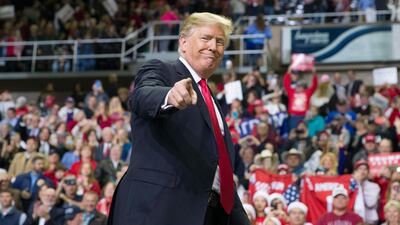For the past two years, it seemed that US President Donald Trump's takeover of the Republican Party was virtually complete, if not irreversible. But setbacks for his administration in recent months suggest otherwise.
The massive Republican defeat in the midterm elections and the disastrous government shutdown have created a growing space for those Republicans working towards a post-Trump era.
These circumstances also invite a serious re-evaluation of subtle but crucial Republican party dynamics during Mr Trump’s presidency.
The 2016 Republican primaries involved a hostile takeover of the party by Mr Trump. Most of the GOP establishment was unenthusiastic about the sudden rise of such a political outsider, and many were plainly appalled. But he won the nomination convincingly, and they all got into line, braced for defeat.
During the presidential campaign against Hillary Clinton, Mr Trump emerged as the uncontested new face of the party, which was increasingly starting to look more like a personality cult, built around him, than a recognisably conservative movement.
Since then, he has only consolidated his support among rank-and-file Republicans. In poll after poll, 80 per cent of Republican voters approve of his performance, and it's clear that 30-40 per cent of them are the kind that, as he has boasted, wouldn't turn against him even if he "shot someone on Fifth Avenue".
As a result of this overwhelming popularity, most other Republican politicians have been loath to challenge Mr Trump. A failure to embrace him invites a primary challenge from his fanatical followers and the possible end of a political career.
So, virtually all Republican officeholders have publicly embraced Mr Trump as if their political lives depended on it, because they did.
But a careful review of what the 2016-2018 Republican-dominated Congress did with extraordinary majorities in both houses complicates this picture.
The two main "achievements" for Mr Trump in Congress during this extended period of total control – conservative judicial appointments and tax cuts for corporations and the wealthy – are standard Republican fare.
Any of his numerous primary opponents could, and probably would, have overseen both of them. And many of them probably would have succeeded where Mr Trump failed, particularly in the botched effort to repeal the increasingly popular Obamacare health law.
Mr Trump the candidate promised many things that made traditional Republicans in Congress uneasy. He advocated a $1 trillion infrastructure spending programme, strong support for entitlements, and a number of working-class oriented initiatives, including on healthcare, all of which utterly failed to materialise.
As Mr Trump increasingly struggles, it's hard not to read the past two years through two parallel narratives.
The first, public and manifest plot line has Mr Trump in total control of all things Republican. But the second, quieter story shows Republicans in Congress limiting their practical, voting support of Mr Trump only to agenda items they already embraced, rendering him more figurehead than leader.
Mr Trump has certainly altered standard Republican rhetoric on populist issues, including immigration, trade, Russia, and alliances, such as Nato.
But in his very first year, Congress pressured Mr Trump to enforce more sanctions against Russia, and the Republican Senate has just voted to disapprove of his plans to remove US troops from Syria and Afghanistan and called for an end to most US military involvement in Yemen.
He has encountered significant Republican congressional pushback to his condemnations of Nato and embrace of Russia.
He has received some grudging support on tariffs and trade wars, but some of his most passionate encouragement has come from union-oriented Democrats, such as Sherrod Brown of Ohio. He certainly doesn’t seem to have transformed the core attitudes of most elected Republicans on free trade or turned them protectionist.
With a few exceptions, his trade actions have been mostly showy declarations without much substance, partly because of congressional resistance.
Immigration may be most revealing. Mr Trump has severely damaged his presidency with the government shutdown he engineered to try to force Democrats to grant him funding to build a wall along the US-Mexico border.
He is even threatening to declare a “national emergency” to seize money without the approval of Congress, preposterously insisting that there is an unprecedented “crisis” at the border.
But why didn't Mr Trump simply order Republicans to fork over this money in the first two years of his presidency, when they controlled the House and Senate? Why didn’t he even ask them for it?
It's probably partly because Mr Trump doesn't particularly care about building an actual wall. What he really wants is a wrestling match with Democrats over the wall, which is a proxy for immigration, and, more deeply, for white communal power.
But it's also partly because a fight over wall funding with an all-Republican Congress would have revealed the gulf between the president's populist and nativist rhetoric, and the continued traditional conservative orientation of most elected Republicans. Besides, Congress cares that the wall is widely unpopular.
Given the dual drubbings of the midterm elections and the shutdown fiasco, a Republican primary challenge to Mr Trump next year is now virtually certain.
If his legal and political difficulties mount, the economy takes a nosedive, or both, it’s easy to imagine a serious and successful one.
Mr Trump retains a powerful hold on the imaginations of most Republican voters. But his grip on the party may be starting to slip.
Hussein Ibish is a senior resident scholar at the Arab Gulf States Institute in Washington


